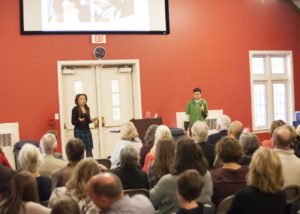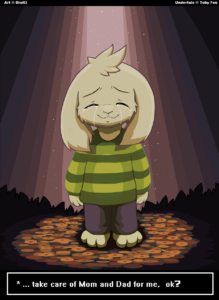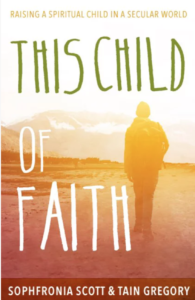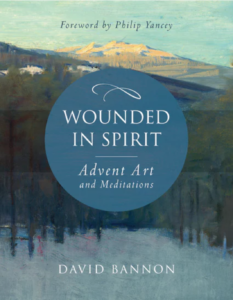Today marks the sixth anniversary of the tragedy at Sandy Hook Elementary in Newtown, Connecticut. Our youngest author, Tain Gregory, and his mother and co-author, Sophfronia Scott, were deeply affected by the events of that day, and wrote about their experiences and their faith in the book This Child of Faith: Raising a Spiritual Child in a Secular World. Tain is 14 now, and today he shares some thoughts on how he has grown since that day six years ago.
—

This past October, I stood with my mom in front of a crowd of people of all ages at Trinity Church in Asheville, North Carolina. We gave a speech about our book, This Child of Faith to an audience of 160 people. Many people in the meeting asked me questions about my experiences and my strong faith, but it was really nice when I got to talk to a younger boy named Collin. Collin was very energetic, and asked questions as fast as a cheetah. We talked to each other after the speech, and he asked questions about people who act mean to others. I think I really helped him a lot. My mom and I have been giving speeches in other churches in many different states. We’ve been doing this for about a year. When I started writing This Child of Faith I was only in 7th grade. Now it is almost the 1 year anniversary of the book, and a lot has changed since then.

I find it amazing that I have been going to church for nearly 8 years! I’ve gone from being a novice in the children’s church choir to being the crucifer leading the church service. I have just started confirmation class, and I have been enjoying it. Confirmation is when you confirm your faith in Christ. We are learning about ways to connect with God, and we are also learning more about Christianity. I have some really nice teachers, and really nice classmates who are there to help me on my confirmation journey. In one of our meetings, we talked about things that society wants us to believe. For example, you should listen to specific types of music and wear specific types of clothes. We wrote these on a big sheet of paper… and burned it in a fire. Then, on another sheet of paper, we wrote things that we believe. Things that no one else tells us to believe, but that we choose to believe ourselves. This was a really good exercise to show that we control what we believe, and that you can expand your faith by believing what you want. I know that believing has helped me expand my own faith a lot.
I’m thinking about this now because this week is the 6th anniversary of the shooting at my former school, Sandy Hook Elementary, and the death of my friend Ben. Ben was very close to me, and losing him was really hard. But I think that the experience of the shooting brought me a lot closer to God. When it happened, I began praying to God a lot more often because I felt sad. But God was helping me with what I was going through because he was there for me.
 Today Ben reminds me of the character Asriel Dreemurr, a child, from a video game called Undertale. Both of them had a very innocent nature, and they were both very kind and friendly. And the main thing they share is that they were both killed. Recently when I was playing through Undertale, I noticed this connection between Ben and Asriel. I started to cry during Asriel’s speech at the end of the game. It was a sad speech. He died for no reason, like Ben. But I love playing Undertale anyway because I like seeing Ben and so many of my friends in the game’s characters.
Today Ben reminds me of the character Asriel Dreemurr, a child, from a video game called Undertale. Both of them had a very innocent nature, and they were both very kind and friendly. And the main thing they share is that they were both killed. Recently when I was playing through Undertale, I noticed this connection between Ben and Asriel. I started to cry during Asriel’s speech at the end of the game. It was a sad speech. He died for no reason, like Ben. But I love playing Undertale anyway because I like seeing Ben and so many of my friends in the game’s characters.
Asriel is still a powerful character. Ben was also powerful and he still has the power to be here. Even though he’s gone, I feel his spirit is still here and still determined to make us happy.
 And God is always there for me, and I know that he always will be there for me. Whenever I am feeling worried about myself, my family, or any of my friends, praying to God is always helpful because I can always ask him to watch over the person I am praying about. I can always trust God to watch over my friends and family because I know he will always find a way to make things better.
And God is always there for me, and I know that he always will be there for me. Whenever I am feeling worried about myself, my family, or any of my friends, praying to God is always helpful because I can always ask him to watch over the person I am praying about. I can always trust God to watch over my friends and family because I know he will always find a way to make things better.
All you have to do is ask him for help. It’s like what Dumbledore says in the film, Harry Potter and the Chamber of Secrets, “You will find that help will always be given at Hogwarts to those who ask for it.” This is the same with God. You can always ask God for help. I have learned more about talking to God. There is one part of my book where I talk about places that I am able to pray. It explains that you can pray to God wherever you are. You don’t have to be in a church kneeling down at an altar. You can talk to God at your house, at the supermarket, even at a gas station! God is always free to listen to you because he cares about you.
—
Tain Gregory is a freshman at Cooperative Arts and Humanities High School in New Haven, Connecticut, and co-author with his mother Sophfronia Scott of the book This Child of Faith: Raising a Spiritual Child in a Secular World. He enjoys watching anime, playing video games, and making Minecraft Hacks.
—

